Submitted:
28 September 2024
Posted:
29 September 2024
You are already at the latest version
Abstract
Keywords:
Summary
Introduction
Materials and Methods
Discovery and Statistical Findings
- COVID is observed in every country of the World with functioning media services (212 countries and territories around the world and 2 international conveyances) [2].
- COVID is preferentially associated with the death of sick and vintage population.
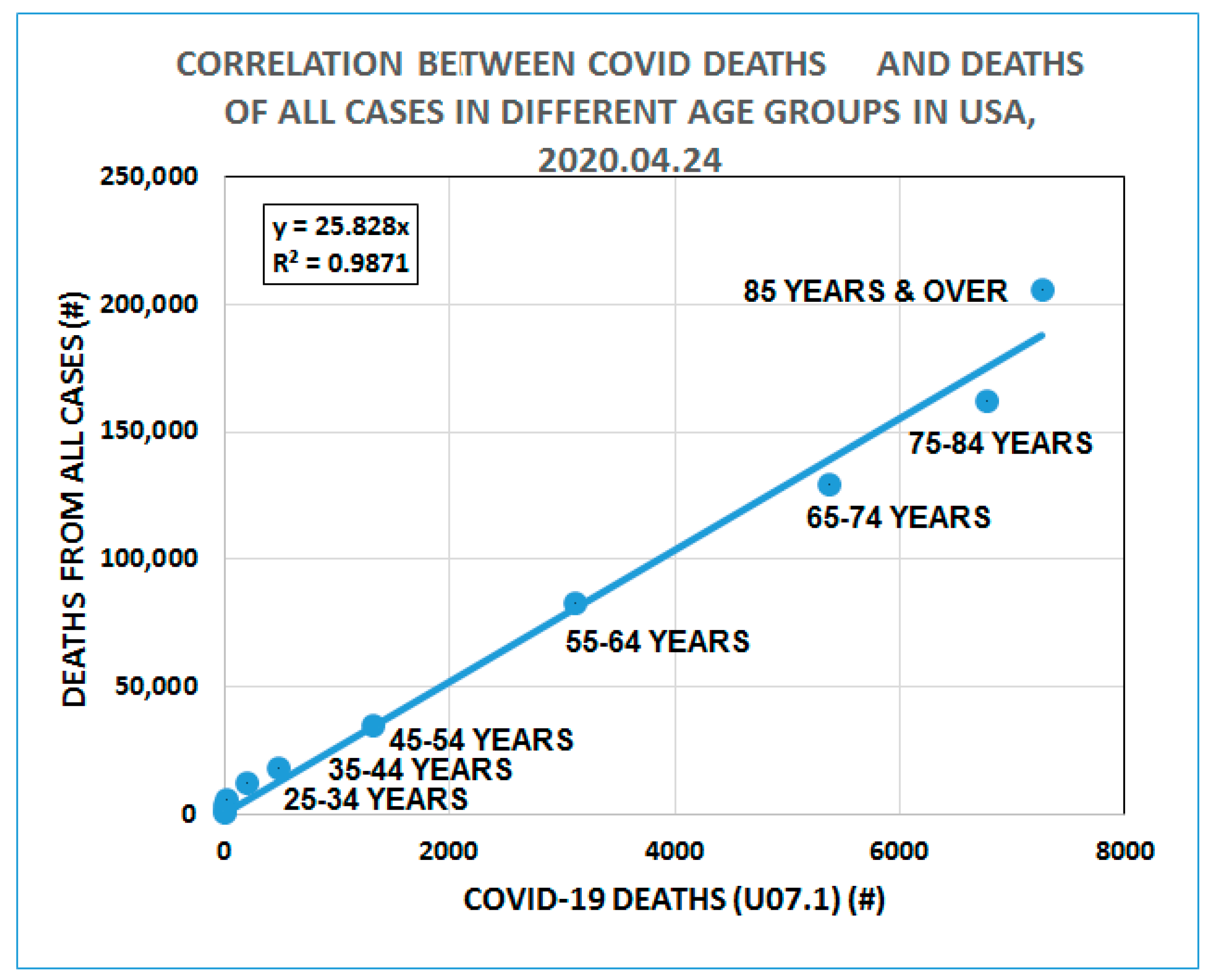
- 3.
- Comparison of the effects of COVID with other serious and life-threatening diseases might provide a good insight into the seriousness of the ongoing epidemic. The first and very important understanding should be that COVID is not the worst killer. Assuming that the rate of COVID deaths continued on the same level as today, (ca. 1,400/day that is 20% of the total, “regular”, “usual” non-COVID deaths) it comes on the third place after heart diseases (ca. 1.800/day) and malignant tumors (ca. 1650/day). Figure 2. Table 1.
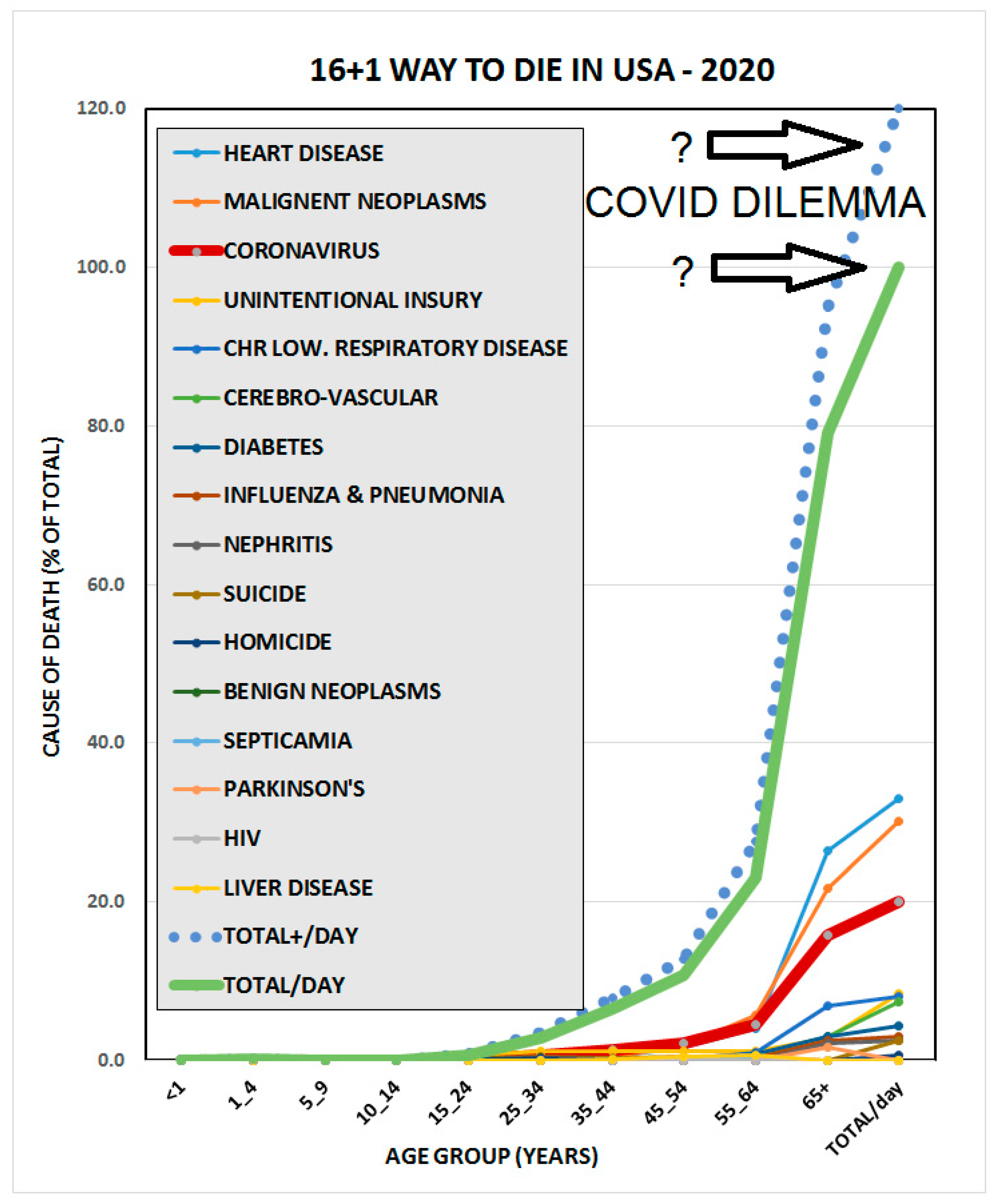
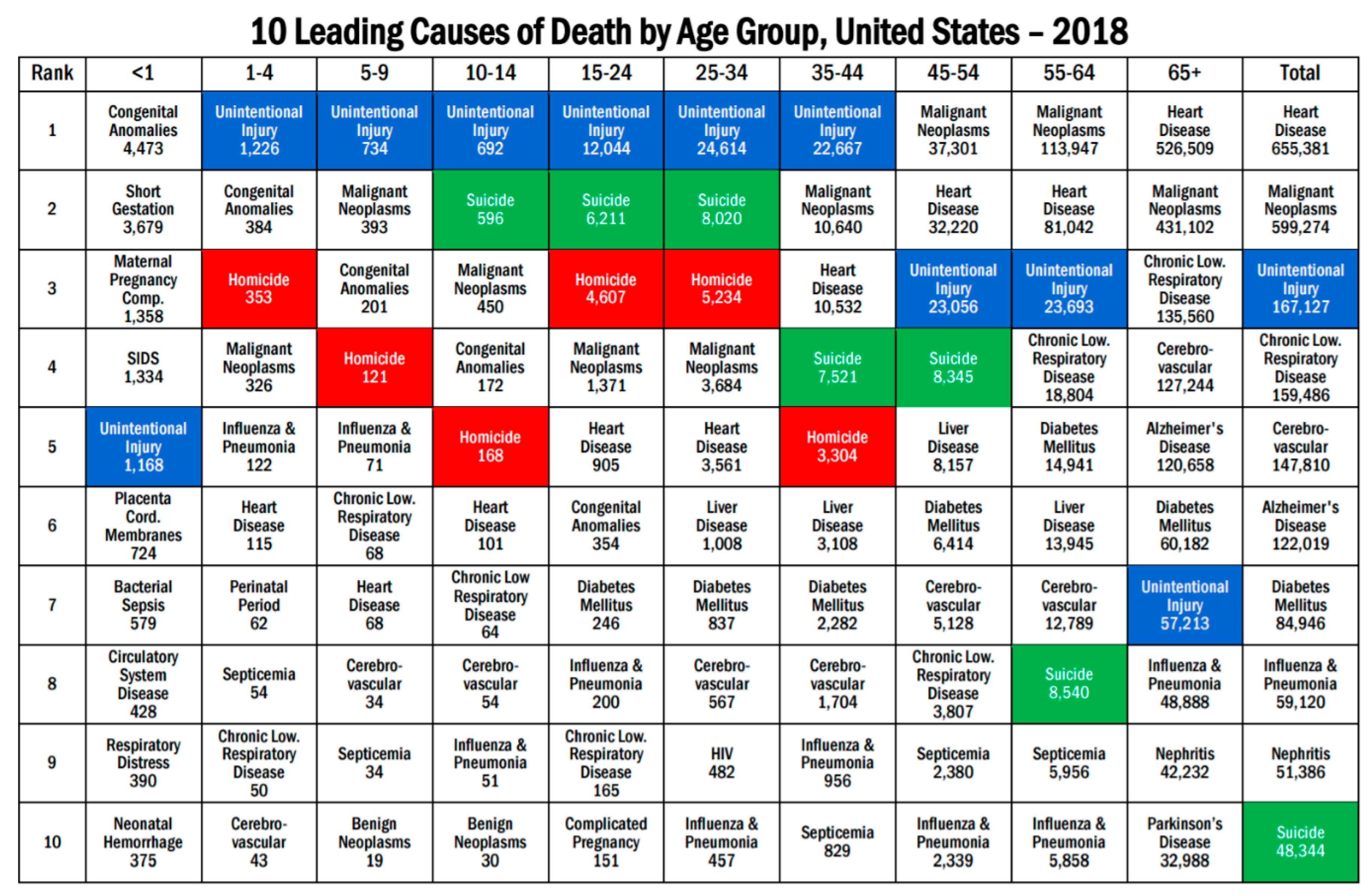 |
- 4.
- The CV dilemma is - if the virus epidemic continues a year – a) will it add, say 20%, (as today), to the deaths caused by the already existing and known causes or, alternatively b) the national mortality remains unchanged, i.e. statistically speaking (!) “only” those will pass away who would die anyway in the coming 12 months?
- 5.
- The negative economic and biological impact of the COVID pandemic is exceptionally large but varies from one state to another. Figure 3. COVID increased the number of total (expected, ALL) deaths in some, but not in every states. It is most noticeable in the most infected areas (NY, NJ, MA, MI, IL, MD, CO).
- 6.
- The selective nature of the medical consequences of COVID disease is a significant difficulty to determine the exact mortality of the disease. It targets almost exclusively seniors and/or persons with serious pre-existing conditions, i.e. persons with increased risk of death even without COVID infection. No one completely healthy young person diseased due to exclusively COVID infection. Consequently the virus is more likely a minor contributing factor in (many) deaths, "the last drop makes the cup run over" and not the sole responsible agent.
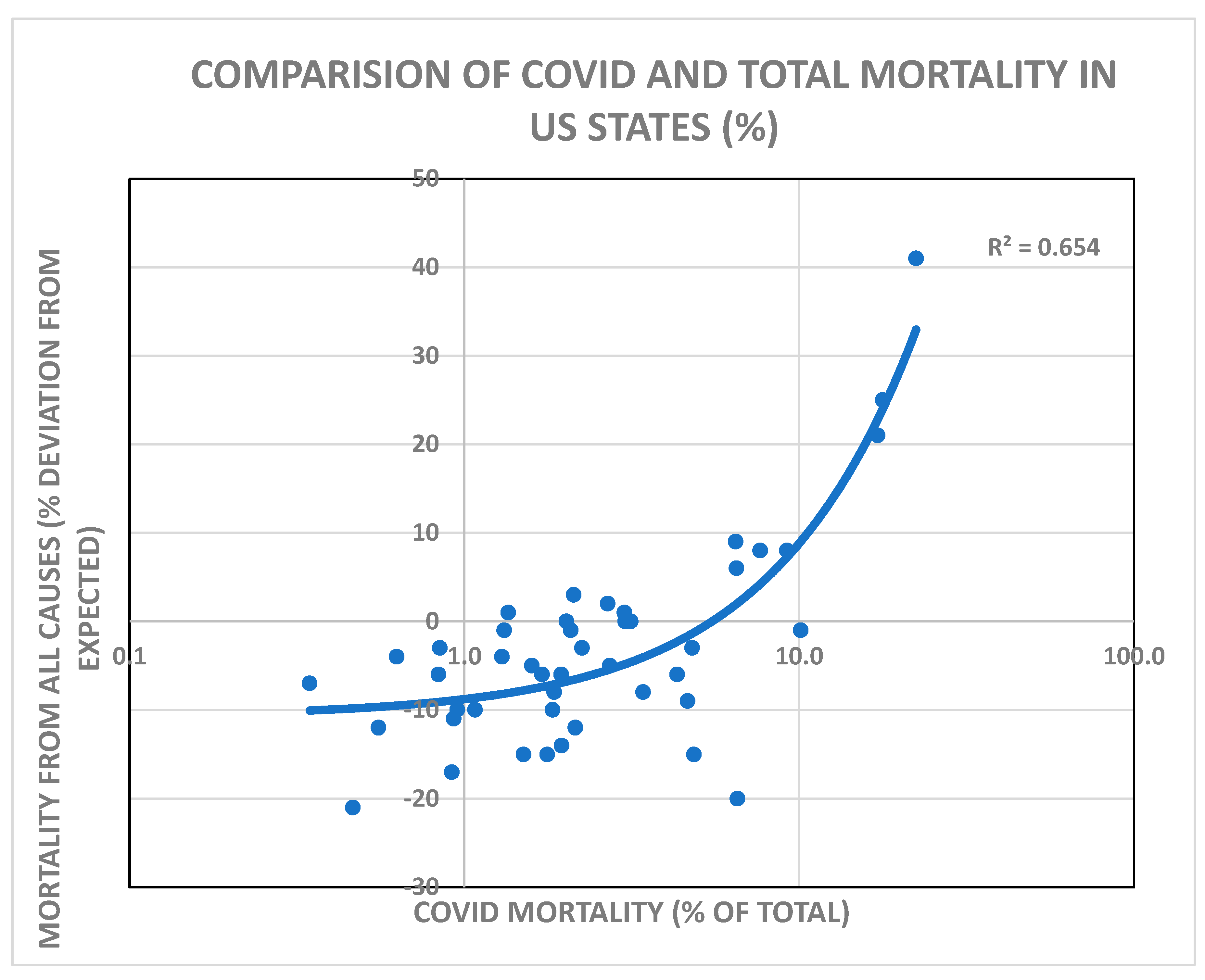
- 7.
- Comparison of the preliminary mortality statistics in the 50 US States suggests that the number of total deaths were significantly increased by COVID only in a few states, it remained at or below the expected level (same as in previous years).
- 8.
- This very un-uniform effect of COVID in different states motivated further search for explanation in other subgroup characteristics of the states. USA is divided not only by geography and climate, but even racial, religious and political affiliations and the related lifestyles.
- 9.
- Novel – previously unexperienced – aspects of an infectious disease was statistically well visible, namely that COVID seems to be “POLITICALLY BIASED” (SIC!).
- 10.
- The 50 states can be sorted into 5 subgroups [5] accordingly to the main political attitude of the citizens: 1) Strong Democratic/SD [13: CA, DE, HI, IL, ME, MD, MA, NH, NJ, NM, NY, VT, WA]; 2) Lean Democratic/LD [8: CO, MI, MN, NV, OR, PA, RI, VA; 3); Competitive/C [10: AZ, FL GA IA KY NE NC OH TX WI]; 4) Lean Republican/LR [5: IN, LA, MO, MT, OK]; 5) Strong Republican/SR [13: AL, AK, AR, ID, KS, MS, ND, SC, SD, TN, UT, WV, WY].
- 11.
- We used the SD + LD (%) / SD + LD (%) ratio (D/R, #) as the measure of the “political bias” of the states. This continuous scale determined the place of every state in the solid-left-to-solid-right political space of the USA, (Figure 4).
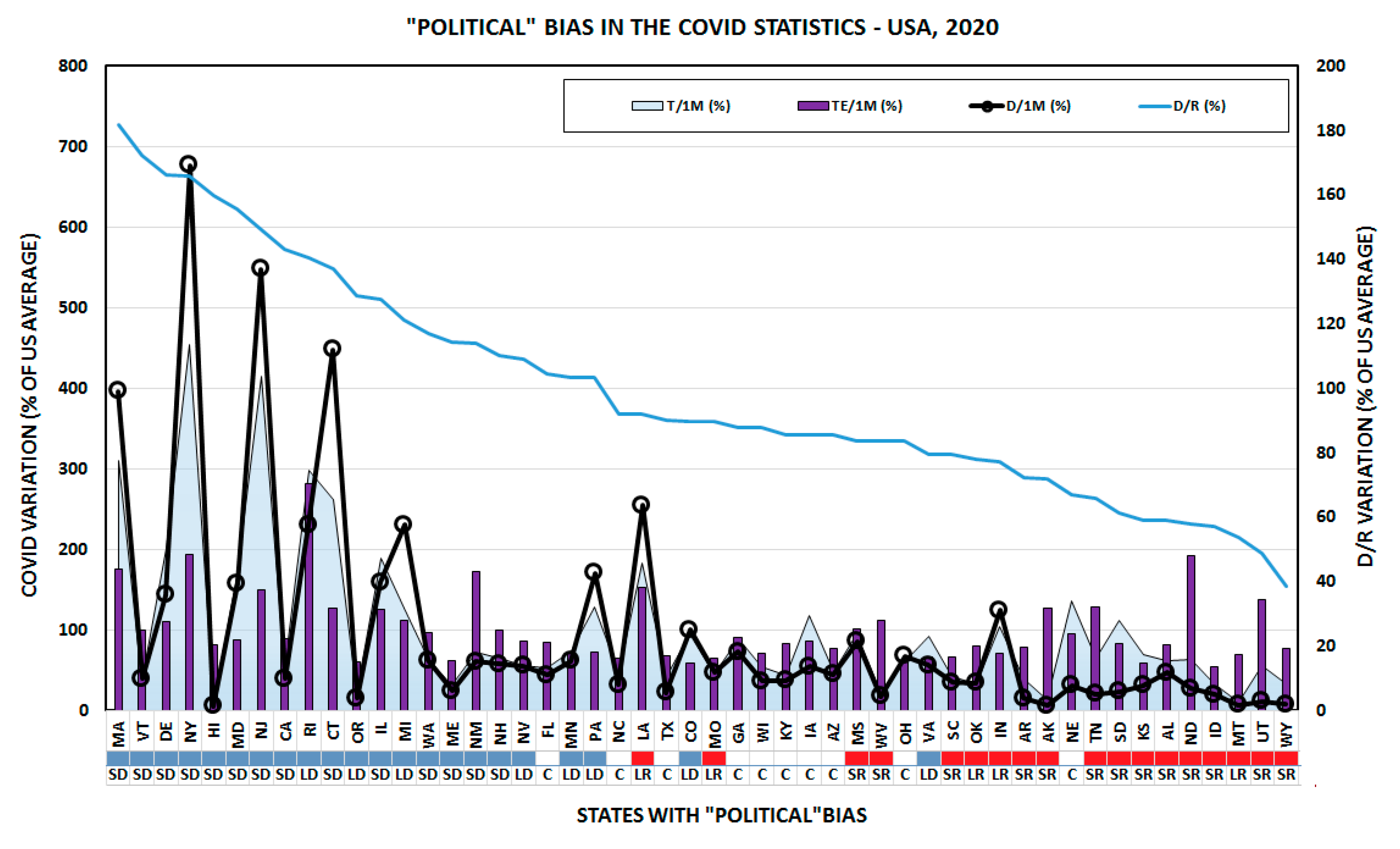
- 12.
- The D/R (%) ratio provided a wide scale of political attitudes of the residents and clearly separated the 50 states from each other: “democrat oriented” with ratios ~100-180%, “republican oriented” between ratios ~30-90% and the “competitive” states between (with a few overlaps). The most striking feature of this graph is the visualization of 6 large picks corresponding to the most seriously affected states. The graph reveals that the total number of COVID cases, the number of total COVID deaths as well as the COVID mortality is far larger and above national average in democrat committed states than in republican or competitive states. There is a large variation in the number of COVID tests in different states but without any statistically significant difference in this respect.
- 13.
- There is a significant increase of the total (all cases) mortality from 92.3% (-7.7% under) of expected to 107% (7% over) of expected from right-to-left on the political scale of the states.
- 14.
- This increase of ALL DEATHS is accompanied by corresponding increase of the average COVID mortality from 1.3% to 7% in the same left-to-right order. Figure 5
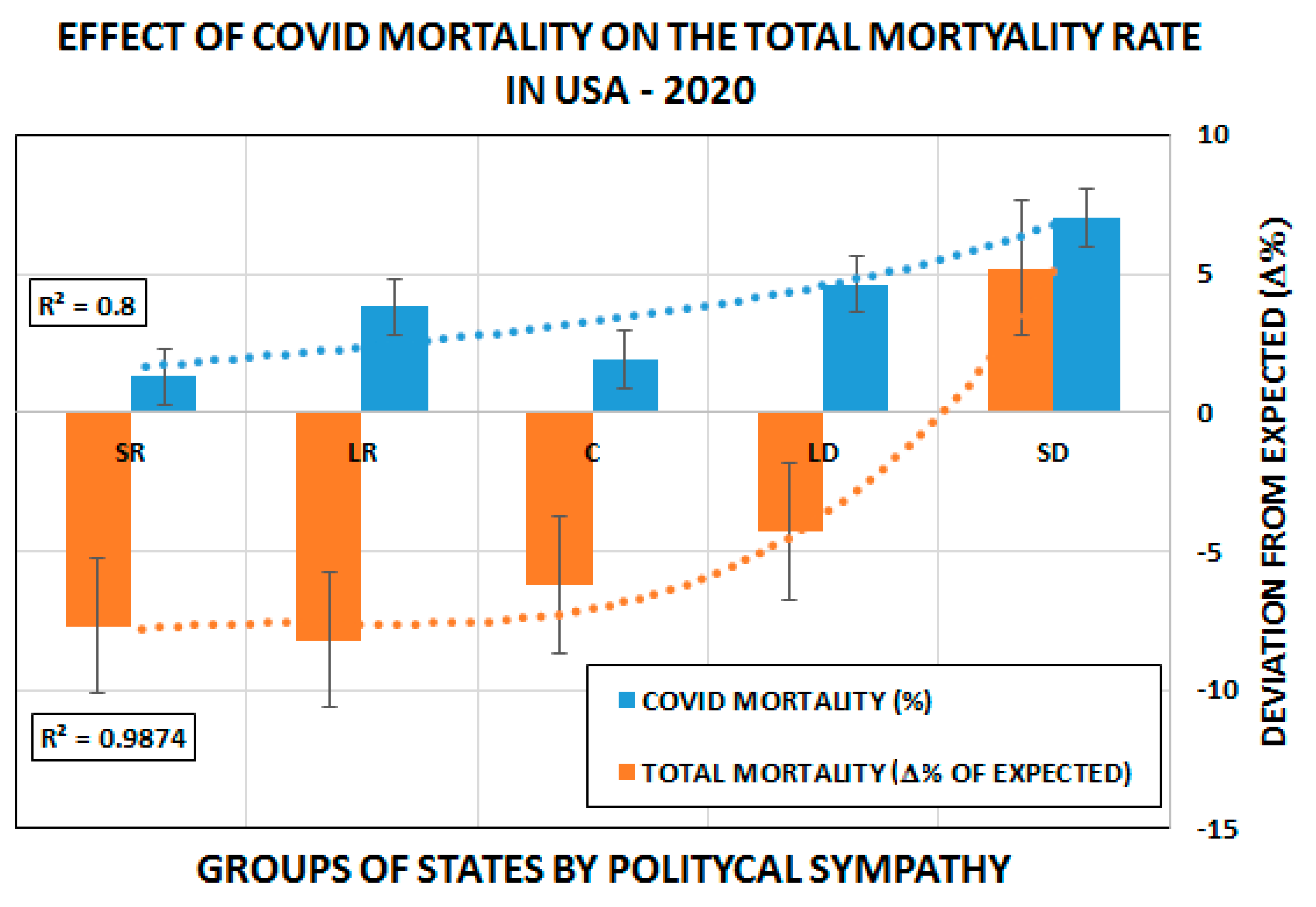
- 15.
- Individual (states-based) as well as category-based (political groups) comparison of all COVID related parameters displays the same major differences: left (democrat) oriented, blue states suffered significantly more damage of the recent epidemic than the right (republican) oriented, red states. (Figures 6–9).
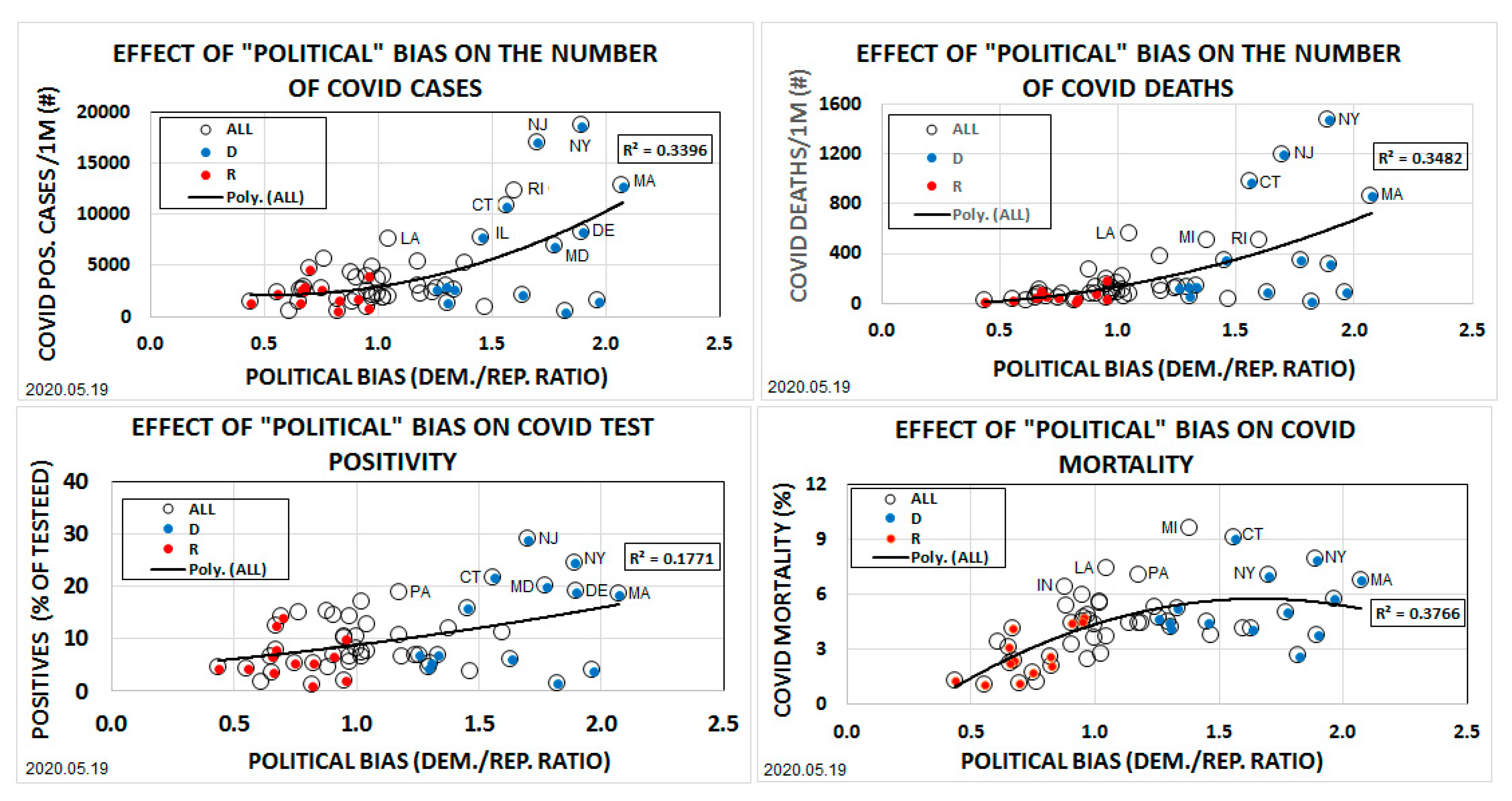
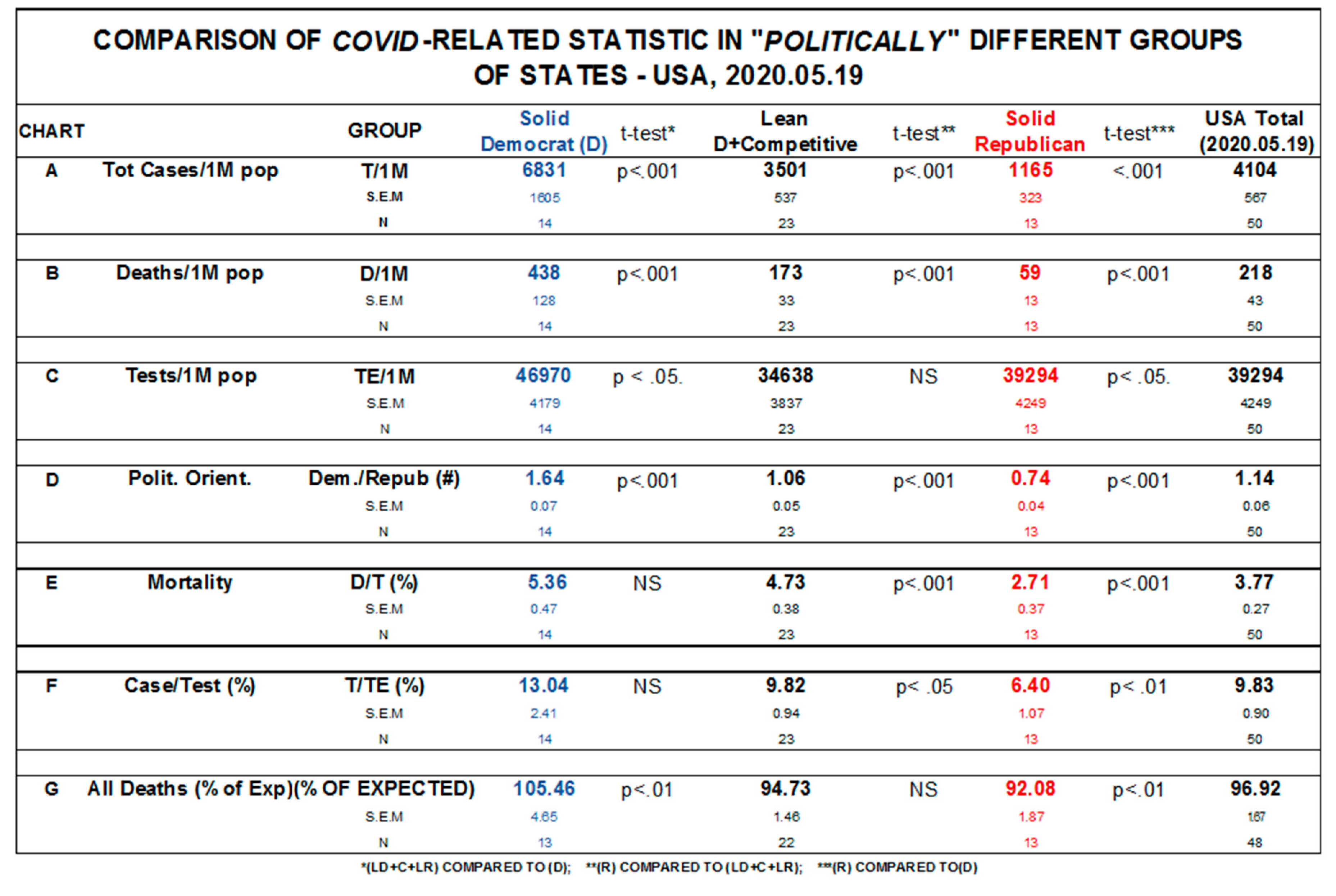 |
Discussion
- 1)
- Epidemic experts predicted the death of >1M persons in USA, hospitals let us believe that unprecedented number of infected persons will need respirators to survival and we started with unemployment and social distancing. The initial alarming predictions turned out to be false but it was too late to mitigate the initial reaction: we remained on the ‘million-deaths’ level of alert.
- 2)
- The diagnosis of COVID disease seemed to be simple, it lead to non-specific, flu-like symptoms. Doctors tended to regard all flu-like cases as COVID, even when the specific test became widely available. The differential diagnoses of COVID from seasonal flu became blurred, poorly defined.
- 3)
- Doctors are often facing a dilemma, when determining the immediate cause of death [6]. It is not difficult to understand, that - in times when all medical attention of the public was focused on the pandemic – COVID became a “popular” as “immediate cause, final disease or condition resulting in death” [Item 26, Part I/(a) on the doctors report sheet]. Death is death.
- 4)
- A unique property of COVID is that it targets almost exclusively sick an elderly with often numerous preexisting conditions. Obviously many diseased were accidentally listed under COVID death category even when that person was close to death anyway.
- 5)
- Another probable reason of over-diagnosing COVID might have been the significant federal economic incentives to hospitals in “fighting the un-visible enemy”
- 6)
- Consequently the statistical data seems to be intentionally or accidentally inflated due to the – probably – well-meaning (but misleading) information from epidemic experts and media.
- 7)
- There were warning signs against the magnitude of the country’s reaction but they were ignored and even suppressed. a) COVID antibodies were detected in large part of the population telling us that most of the infections were silent [8]; b) independent emergency doctors reported that their hands on experience didn’t match with the suggestions of “administrative” doctors who have never seen any patient, neither alive, nor dead [9]; c) It was also reported, that healthcare administrators (non-doctors) were pressing doctors to list COVID as immediate cause of death wherever and whenever it was possible; d) states started reporting “likely” or “probable” cases in April 2020 (not only test-confirmed cases) [10].
- 8)
- Replacing the exact laboratory (test) and x-ray diagnosis of COVID disease and cause of deaths’ with permitting the strongly subjective, discretionary “best judgment” of thousands of doctors strongly and unevenly diluted the statistical data. The difference between exact and “hearsay” diagnoses is 300% (SIC!, see statistic from NY State and NY City). Consequently our public understanding of the COVID epidemic and the reason of our introverted defense policy to it is highly unreliable.
Main Findings
- A.
- The recent study confirmed the well-known fact, that COVID almost exclusively targeted elderly and already sick persons with preexisting condition(s). Almost no young and healthy person became life-threateningly ill or died due to the epidemic. This part of the study seems to be solid and widely accepted.
- B.
- The novel observation in this study is the discovery of signs of “political bias” in the statistical data. Our results suggest that D states with dominating orientation toward ‘democrat’ ideology (life-style?) are more receptive for COVID disease and the outcome is more often terminal in these states, than R states, those more committed to ‘republican’ ideology (and lifestyle?).
- C.
- Another important, but probably controversial suggestion in this study is that the impact of COVID on the total mortality rate of the country is not or minimally influenced by the virus deaths. Even if there will be some increase in the total deaths at the end of this year, we can expect a compensatory reduction of the total mortality of the next year. It seems to be unlikely that any young and healthy person was killed by the COVID.
Conclusions
- -
- the serious disturbance of the normal life of the majority of the people, there the recovery might take considerable time;
- -
- the serious damage of our relation to China;
- -
- the serious damage of our relation to WHO;
- -
- acceleration of social tensions, incl. violance.
References
- Jiaquan Xu ET AL., Mortality in the United States, 2018. NCHS Data Brief No. 355, January 2020 - https://www.cdc.gov/nchs/products/databriefs/db355.htm#:~:text=Between%202017%20and%202018%2C%20death,(4%2C472.6%20to%204%2C386.1)%2C%20and.
- Worldometer - COVID-19 CORONAVIRUS PANDEMIC - https://www.worldometers.info/coronavirus/#countries – Accessed 2020.05.11.
- National Vital Statistics System, National Center for Health Statistics, CDC. Produced by: National Center for Injury Prevention and Control, CDC using WISQARS™ - https://www.cdc.gov/injury/wisqars/pdf/leading_causes_of_death_by_age_group_2018-508.pdf - Accessed 2020.04.20.
- National Vital Statistics System – CDC, Centers for Disease Control and Prevention – Updated: May 6, 2020, Accessed 2020.05.19.
- 2018 Gallup tracking and 2018 Gallup Poll Social Series surveys. – Cited in State Party Identification and Leaning, 2018 - Politics, Feb.22, 2019 -https://news.gallup.com/poll/247025/democratic-states-exceed-republican-states-four-2018.aspx - Accessed. 2020.05.10.
- U.S. DEPARTMENT OF HEALTH AND HUMAN SERVICES. Centers for Disease Control and Prevention National Center for Health Statistics - Instructions for Completing the Cause-of-Death Section of the Death Certificate for Injury and Poisoning - https://www.cdc.gov/nchs/data/dvs/red_form.pdf.
- Begley S. Influential COVID-19 model uses flawed methods and shouldn’t guide U.S. policies, critics say, April 17, 2020. https://www.statnews.com/2020/04/17/influential-covid-19-model-uses-flawed-methods-shouldnt-guide-policies-critics-say /. Accessed 7 June 2020.
- New York State study (published April 23rd, 2020) indicates that the actual fatality rate of epidemic in NYS could be as low as 0.78%. Is rises the possibility that COVID-19 is just another regular flue under the microscope of mass hysteria.
- Dr Dan Erickson & Dr Artin Massihi: Press Conference on April 24th, 2020 – 23ABC NEWS - https://www.turnto23.com/news/coronavirus/watch-controversial-press-conference-held-by-two-bakersfield-doctors-that-was-pulled-down-by-youtube.
- New York City started counting "probable deaths" - deaths without a confirmed positive coronavirus test but with "COVID-19 or an equivalent" listed on a death certificate - on April 13. Data before April 13 includes confirmed coronavirus deaths only. – Source: NYC Government.
Disclaimer/Publisher’s Note: The statements, opinions and data contained in all publications are solely those of the individual author(s) and contributor(s) and not of MDPI and/or the editor(s). MDPI and/or the editor(s) disclaim responsibility for any injury to people or property resulting from any ideas, methods, instructions or products referred to in the content. |
© 2024 by the authors. Licensee MDPI, Basel, Switzerland. This article is an open access article distributed under the terms and conditions of the Creative Commons Attribution (CC BY) license (http://creativecommons.org/licenses/by/4.0/).





